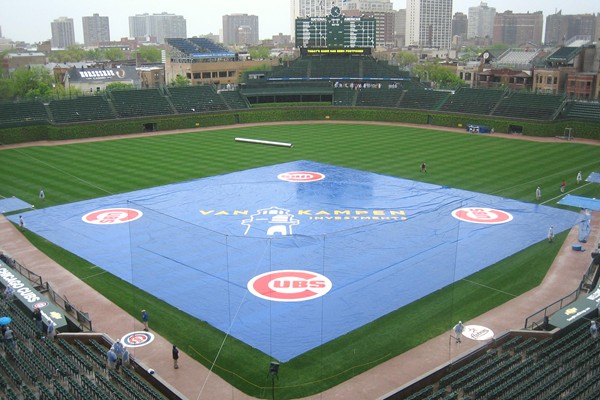Via my college friend D.M., the New York Mets and Yankees have discovered the Intro to Microeconomics lesson of the effect of higher prices on quantity demanded, a.k.a. "overcharging:"
OK, so neither the new Yankee Stadium nor its counterpart in Flushing can handle the capacity of their predecessors. Fine. But where are the 53,070 people who came nightly to the old Yankee Stadium in 2008, and where are the 49,902 who showed up every night in the final season of Shea Stadium?
So far, the Yankees are averaging 44,636 in their new crib, the Mets 38,806. If baseball is so popular in this town and Yankees and Mets games truly are must-see events, as both clubs insisted throughout the offseason, why aren't there 10,000 people milling around outside their ballparks every game night, trying to buy up every last ticket in the house, and the rest going home empty-handed and disappointed?
One of the reasons, of course, is simple and self-evident. It's the economy, stupid. But in a metropolitan area that certainly has more than 83,442 people - the combined average attendance at both parks - wealthy enough to buy their way into these exclusive clubs dressed as ballparks, there has to be something more to it.
So how high are the prices at Citi and Yankee? High. But hard to break down easily. For today's game against the Marlins, fans have 29—yes, twenty nine—price levels, from the $19 "Promenade Reserved" section near LaGuardia, up to the $375 "Delta Club Gold" section sitting on a diamond-encrusted golden throne in the Mets' dugout. The seats I would look for, upper deck box seats in the infield (Citi sections 406-428, the "Promenade Box") are $35.
Wrigley, today, has three price levels left (because the park is nearly sold out), $56 for upper deck box infield up to $90 club box infield. (Good seats, though--the $56 seat is right above home plate.)
I should point out, both the Mets and Yankees are in first place today, and the Cubs...well, they're not, but they are at least one game above .500.
So is it just the price of going to the park that is keeping people away from New York baseball parks? Or is it something else?
Two kinds.
First, I have complained previously that the City has not always been terrifically helpful notifying people about street sweeping. Since I can sometimes go a couple of weeks without driving, I've gotten a number of $60 tickets (some with art, because the street sweeping machines have cameras now), even after checking the purported schedule online. Today, I am happy to report, my alderman's office sent an automated notice about street sweeping a week in advance. Color me impressed. I suppose the parking meter nonsense has gotten the aldermen sufficiently nervous about carrying out their usual parking ticket scams.
Second, last night I had the misfortune of watching the Cubs lose 2-1 to the Dodgers, the latter being so confident of the outcome that they deliberately loaded the bases with one out in the 9th. Did the Cubs get a hit to tie (or even win) the game? No, they did not. This is the fourth game in a row the Cubs have lost to the Dodgers; the three previous losses, as many will recall, happened last October in the National League Division Series. Phooey.
Our seats were in section 512, row 9. Here's the view:
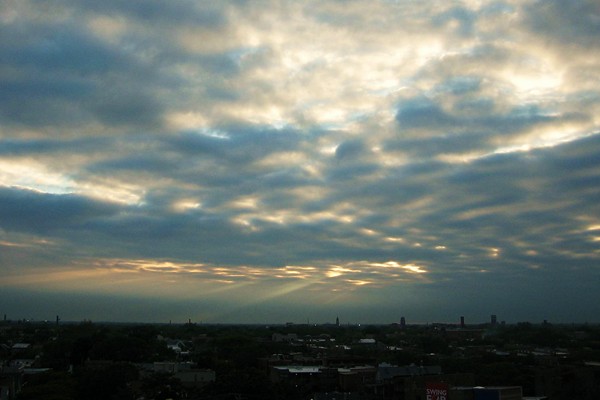
I'm only half kidding; we really were in the top row of the ballpark, and that really was the view to the west. Here's the view to the east:
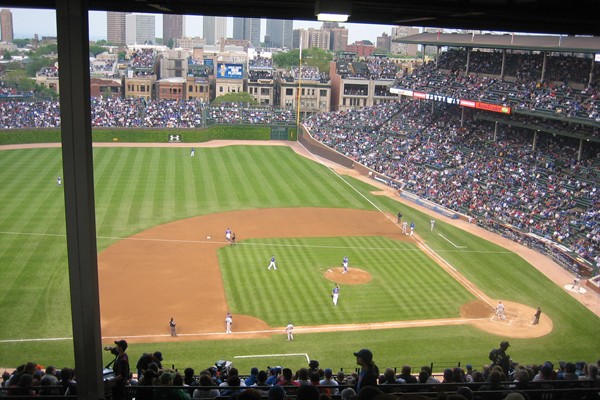
I actually like sitting all the way up there. That way, when Zambrano beats up the Gatorade dispenser I can't see it, and my psyche is not permanently scarred.
The Chicago Bar Project. Now how come I didn't see this earlier?
Odd as it seems[1], the parking meter fiasco may turn out to be the turning point of the Daley administration. The city of Chicago today had to declare a moratorium on parking tickets because too many meters and kiosks are broken:
The private company that earlier this year assumed operations of the city's 36,000 paid street parking spots recently promised to speed up installation of pay-and-display boxes after suffering widespread problems with coin parking meters. The new boxes, roughly one per block, take credit cards in addition to cash, eliminating the need to lug around a bagful of quarters.
But many of the new pay boxes---including those near City Hall---were not working today.
... Police officers told drivers they had received orders not to issue any parking tickets today due to "issues" with the parking meters.
[1] I say "odd" because Daley has been accused of far worse things than this over the years. But this one affects people's cars, so it got everyone's attention.
The Cubs finally pulled one out last night, winning 6-1 in 5½ innings before the game got called for rain. This afternoon, of course, they can resume losing, but at least they stopped their losing streak for a night.
That's how many the Cubs have lost as of last night. Somehow, even with Mr. T (yes, that Mr. T) revving up the crowd in the 7th inning, even with 8 runs, even with a sell-out Wrigley, they lost. Again. The game's highlight, from where I sat (on the third-base side where I couldn't see the Cubs' dugout), was Freddy Sanchez going 6-for-6. Unfortunately, Sanchez got those six hits for the Pirates.
Not much more to say, but for those of you who haven't been to Wrigley and wondered what Waveland Avenue looks like, voilà:
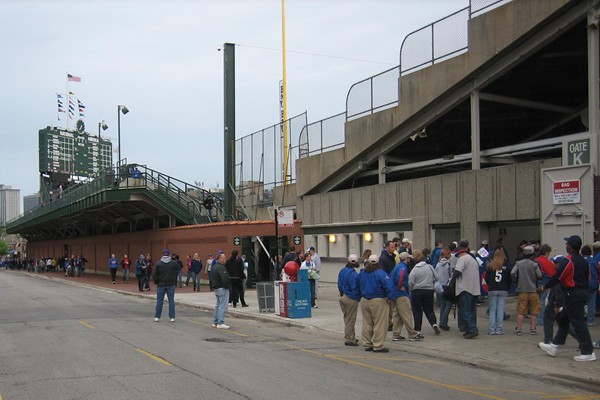
As we wake up today to news that North Korea has reportedly detonated a 20-kiloton atom bomb (first reported, actually, by the United States Geological Survey), it's worth remembering two other major news events from previous May 25ths.
In 1977, Star Wars came out. (I saw it about a week later, in Torrance, Calif. My dad had to read the opening crawl to me.)
In 1979, American 191 crashed on takeoff from O'Hare, at the time the worst air disaster in U.S. history.
And now we add to that a truly scary development in Asia. And it's not yet 8:30 in Chicago...
Cold fronts always seem to arrive with more fanfare than warm fronts, even when they don't bring precipitation or even clouds with them. Here's the U.S. situation as of 7pm this evening:
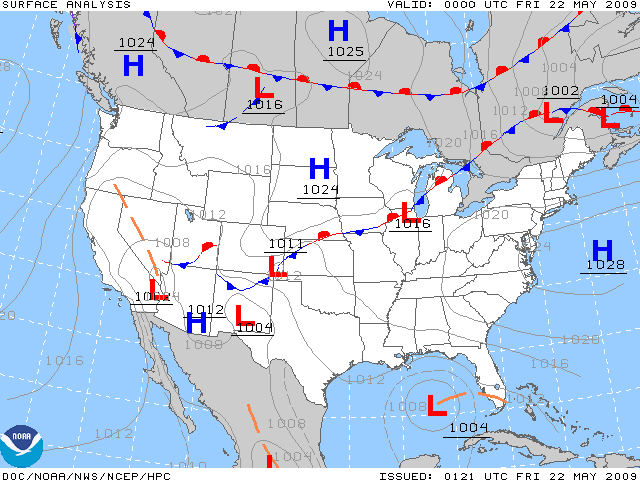
Since then, the cold front shown draped over Chicago has moved east, passing over the city at almost exactly 8:35 pm. I know this because I had the windows open so their paint could dry.
Some explanation: Because it's critical that the Inner Drive Technology International Data Center not melt, I keep careful watch on the server rack's temperature. At 8:32pm, the servers labored under oppressive 30.5°C heat—very close to the point where they shut down spontaneously. Five minutes later, the temperature had dropped 1.5°C; five minutes after that, another 1°C; and within an hour—that is, by 9:27pm—the server rack was ticking along nicely at 25°C.
Ordinarily, when I know the temperature outside will hit 30°C, I turn on the A/C. Today, however, I had painters working on the windows, which meant for several hours I actually had none. (Windows, that is.) So my poor servers had to deal with box fans and whatever happened outside.
I, also, was sitting outside at the time, wearing shorts and a polo shirt. Officially, the temperature dropped just as precipitously in the real world as it did in my apart—er, office: from 27°C at 7pm to 19°C at 9pm.
Warm fronts sneak up on you. Cold fronts, while appreciated in the summer (as tonight's was), hit hard. Sometimes, looking at the actual data, it surprises me how hard they hit.
I'm sweltering in 31°C stickiness at the Inner Drive Technology World Headquarters, because the painter is doing the office windows. Apparently they're much easier to do off the rails than on, and he objected to working around the air conditioner. Tomorrow it'll be 15°C in Chicago, but he's here today, so.
So while the IDT International Data Center barely hangs on (servers hate temperatures over 25°C), and while my hot dog pants on the bathroom floor, apparently Kraft Foods and Sara Lee Corp., two Chicago-area companies, are embroiled in a lawsuit about other hot dogs:
Sara Lee, maker of Ball Park franks, said that Northfield-based Kraft Foods Inc., purveyor of Oscar Mayer hot dogs, is running ads that claim one particular Oscar dog trumps the taste of Ball Park's entire line. One of those ads appeared in Wednesday's USA Today in conjunction with a giveaway of up to $1 million in Oscar Mayer hot dogs.
The full-page USA Today ad claimed that Oscar Mayer Jumbo Beef Franks beat Ball Park and ConAgra Foods' Hebrew National hot dogs in a national taste test. But in a footnote, the ad notes that the Oscar Mayer Jumbo Beef frank is being compared to the "leading beef hot dogs" made by its rivals.
The Sara Lee suit, filed in U.S. District Court in Chicago, says the ad is false and misleading because in large type it implies one Oscar Mayer dog bested the taste of all Ball Park dogs. But the footnote, "in very small type," says that Oscar Mayer compared its hot dogs to "the leading beef franks" of its main rivals.
Parker and I will investigate the competing claims and report back soon.
Sometimes you win. Sometimes you lose. And sometimes, it rains.
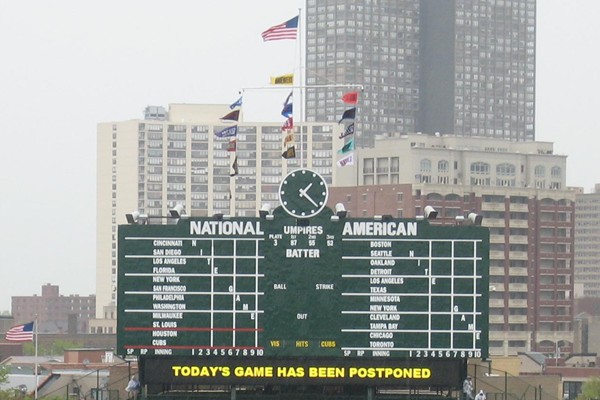
And of course, Wrigley has its own TARP:
